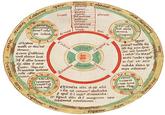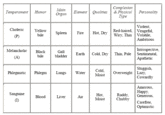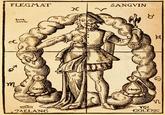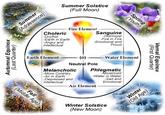The Four Humors
Deadpool 15,755
This entry has been rejected due to incompleteness or lack of notability.
To dispute this DEADPOOL flagging, please provide suggestions for how this entry can be improved.
NOTE: This Entry was related to the 2013 April Fools joke. For more information, please check out the KYMdb Offline Crisis Response Initiative.
| Navigation |
| About • Origin • Spread • History of References • External References • Recent Images |
About
The Four Humors are four bodily fluids that Humorists[1] believed to be the primary composition of the human body, propagated by ancient Greek physicians. The fluids, black bile (melan chole), yellow bile (chole), phlegm (phlegma) and blood (haima), each correspond to personality traits known as the Four Temperaments.[2]
Origin
While the basic idea that the composition of one’s internal fluids reflect the person’s outward demeanor dates back to the ancient Egyptians and Mesopotamians. the internal fluids weren't systematically categorized until approximately 400 BC when the ancient Greek physician Hippocrates[3] asserted that the amount of each of the four humors inside a person affected their moods and emotions. Hundreds of years later, circa mid-to-late 100s AD, physician Galen of Pergamon[6] directly correlated the humors to Empedocles’[4] theory of the four classical elements[5] earth, wind, fire and water in his dissertation De temperamentis.[9] If someone was in excess of one of the humors, they took on the strongest personality traits affiliated with them: Blood was associated with the "sanguine," sociable and epicurean, yellow bile was "choleric," ambitious and enthusiastic, black bile was "melancholic," introspective and observant, and phlegm was "phlegmatic," carefree and serene.

Spread
The Four Humors were a key section in The Canon of Medicine[7] (القانون في الطب al-Qānūn fī al-Ṭibb)completed in 1025 A.D., which contained all of the known medicine knowledge at the time. The book was originally written in Arabic and later translated into seven other languages and used in medical universities until as late as the 17th century. The four humors gained more associated objects and traits (shown below), which were often exemplified by characters in William Shakespeare’s plays[12] who would criticize each other by referencing their possible humor imbalances.[13]
In the 1600s, Nicholas Culpeper[8] published at least two papers theorizing on the use of the humors in medicine. Many other philosophers and theorists have postulated arguments about the Four Humors over the course of the 18th – 20th centuries, including Immanuel Kant[10], who argued that a person could not freely switch between the temperaments.
History of References
External References
[2] Wikipedia – Four Temperaments
[3] Wikipedia – Hippocrates
[4] Wikipedia – Empedocles
[5] Wikipedia – Classical elements
[7] Wikipedia – The Canon of Medicine
[8] Wikipedia – Nicholas Culpeper
[9] Internet Archive – De temperamentis
[10] Wikipedia – Observations on the Feeling of the Beautiful and Sublime
[11] Kheper – The Four Humours
[12] U.S. National Library of Medicine – And there's the humor of it: Shakespeare and the four humors
[13] Examiner – Shakespeare 101: what are the humours?
Share Pin
Recent Images 7 total
Recent Videos 0 total
There are no recent videos.






